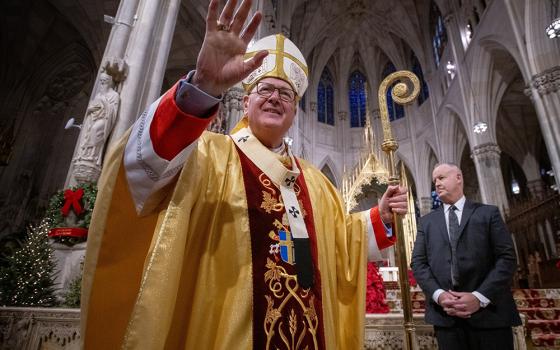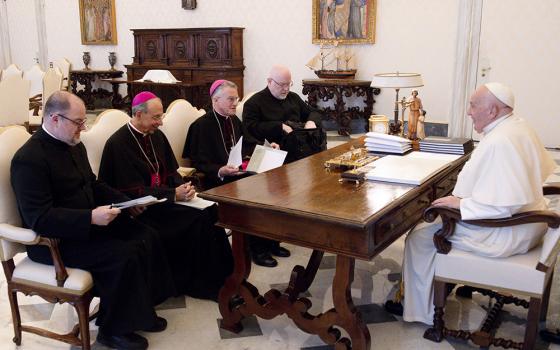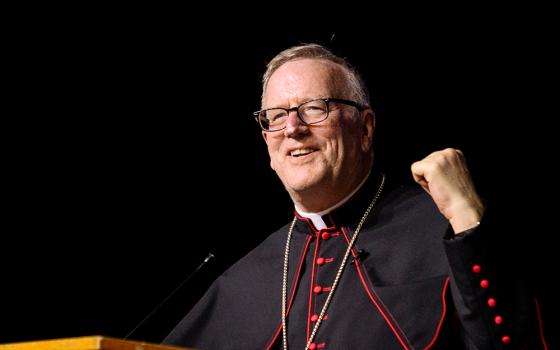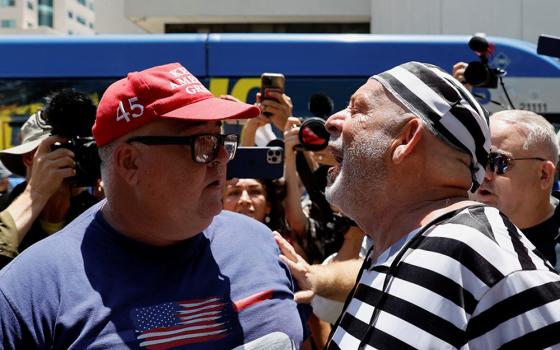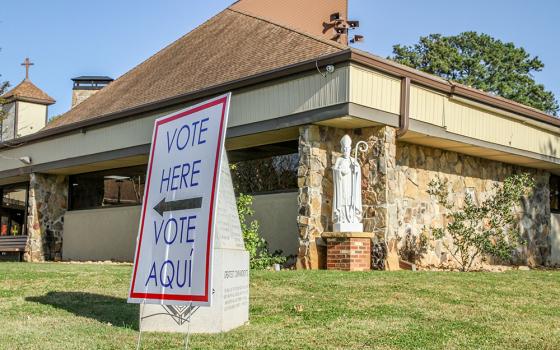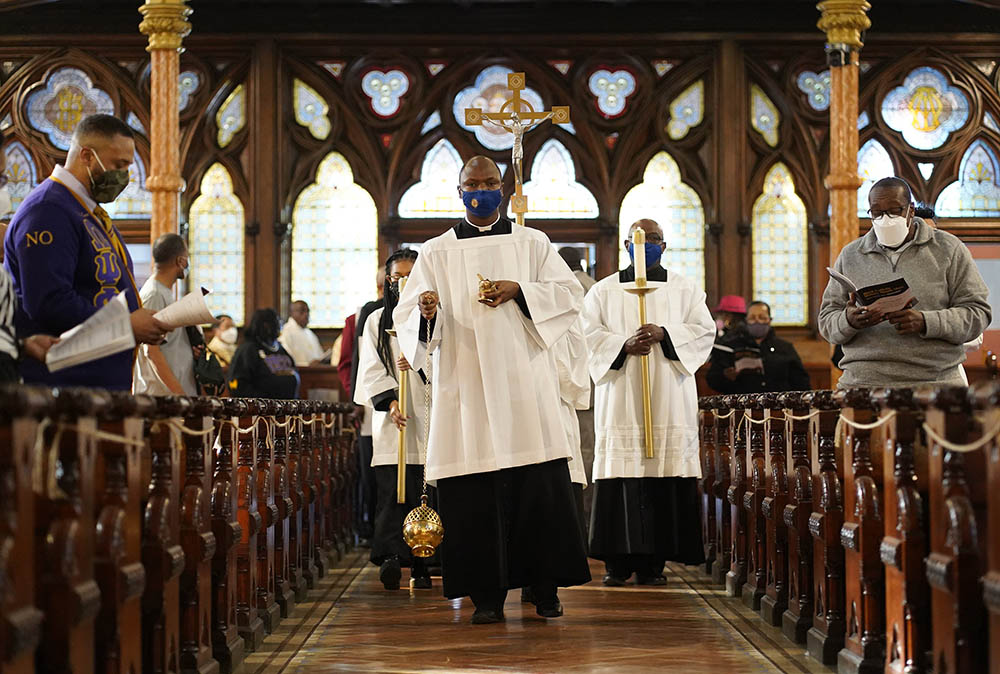
Toby Offiah, a seminarian of the Diocese of Brooklyn, New York, leads the opening procession during a Mass marking Black Catholic History Month on Nov. 21, 2021, at Our Lady of Victory Church in the Bedford-Stuyvesant section of Brooklyn. (CNS/Gregory A. Shemitz)
I discovered the Eucharist in my college chapel during my senior year. The chapel is small and relatively simple, a huge difference from the stone Gothic parish church in town, with its deep organ and bell tower. The post-Vatican II chapel is in a semicircle around the altar, with a metal tabernacle in a small alcove on the side. Red carpet lines the chapel, and stained-glass windows with semi-accurate paintings of saints (St. Therese of Lisieux looks about sixty years old) fill the church. On the last day of every term, right before finals, the Catholic student center hosts an all-night adoration, where the monstrance is illuminated at the center of the darkened chapel, and students filter in and out for prayer and worship. It was there I realized the goodness of the Eucharist.
In my Protestant upbringing, I experienced some of this goodness. I can remember, as a kid, watching my dad take the small wafer and grape juice and sit in a time of prayer before taking it during our Baptist church services. I would try to copy him, saying a quick prayer of thanks as I took Communion. But Communion, for me, was never a reprieve in suffering. It was never a particular source of strength, just an encouragement for prayer.
By my senior year, I dabbled in Catholicism for a while, attending some Masses and spending late-night study hours in the Catholic student center’s library. But even while active in the center, I wasn’t sure that I would ever become Catholic. Anglicanism appealed to me, and growing up in Baptist churches, I had a lot of misconceptions about Catholicism, from the saints to the papacy to Mary. But something pulled me towards the Eucharist. Miracles like those recorded by Blessed Carlo Acutis made me realize that the sacrament wasn’t just a memorial or an encouragement to pray. Instead, the wafer and cup of diluted wine consecrated at Mass was the body, soul and divinity of Christ.
Navigating a church still detangling itself from white American Christianity has led to painful encounters with racism and ignorance.
But while sitting in that all-night adoration, something else shifted in me. I saw that God was willing to become fragile for us. Not fragile in the sense of losing power and glory, but the self-emptying that Saint Paul speaks of:
"Have this mind among yourselves, which was in Christ Jesus, who, though he was in the form of God, did not count equality with God a thing to be grasped, but emptied himself, taking the form of a servant, being born in the likeness of men. And being found in human form, he humbled himself and became obedient unto death, even death on a cross." (Philippians 2:5-8)
This beautiful reality of love, that God was willing to give himself in this form for us, shifted my entire view. It wasn’t by an earthquake, a lightning strike or some natural showing of power; it was bread and wine in tabernacles and Masses across the world. Because of this shift, I could see God more in my own sufferings. Jesus' sacrifice on the cross wasn’t just a historical event that I could objectively see as true. In the Eucharist, his suffering for and with us was made present.
This past year, I’ve held on to that truth. It’s been hard, especially in the midst of the present turmoil. Our brothers and sisters have been ignored for political and selfish gain and turned into scapegoats for our societal issues. The immigrant, the poor and the minority have been ridiculed, stereotyped and treated with contempt by politicians like Donald Trump and others. Millions are in fear of being deported by ICE, humanitarian aid across war zones and poverty-stricken countries are frozen and Nazi salutes are performed at inaugurations and pro-life rallies.
On top of that, navigating a church still detangling itself from white American Christianity has led to painful encounters with racism and ignorance. I don’t often see myself represented among the laity or the priesthood, and being Black and Christian in this country still consists of enduring racist comments and jokes.
But God is not ignorant of our suffering. Christ sees and enters into it. At the Eucharist, we’re united to him, given grace to overcome our situations and reminded of the hope we have in Christ.
The church, though the body of Christ, is still made up of humans. It can and will let us down. There are days when I feel like singing along with Thea Bowman’s rendition of "Sometimes I Feel Like a Motherless Child" in her USCCB address when I feel the church has abandoned me and those suffering from injustice across the world. But even in that despair, the Eucharist is our greatest hope. It’s Christ. How could it not be?
Advertisement

